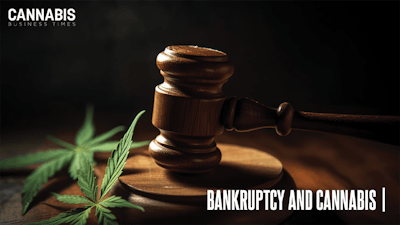
Is bankruptcy relief on the way for struggling cannabis businesses?
It’s complicated.
As those working in U.S. cannabis businesses know, operators in this space face unique challenges due to the conflicting legal status of cannabis at the federal and state levels. As the industry faces continued headwinds, many operators are learning that pursuing bankruptcy is yet another area that is far more difficult for cannabis businesses than businesses in other industries. However, recent court cases and the possible rescheduling of cannabis could signal that bankruptcy relief may be on the horizon for the industry (or at least certain portions thereof).
What is bankruptcy?
Bankruptcy provides a legal framework for businesses to restructure or liquidate their assets in the face of financial distress. The process involves a court proceeding to resolve the debtor’s outstanding debts and provide a fresh start for the debtor.
However, for cannabis businesses, the road to bankruptcy relief has been fraught with obstacles. To be eligible for relief, businesses must comply with the Bankruptcy Code and other federal laws. If not, the United States Trustee, in its role as the watchdog of the bankruptcy system, will move to dismiss the bankruptcy case. Because growing and selling cannabis remains illegal at the federal level, plant-touching businesses and even service providers that have worked with cannabis companies can have difficulty getting over this initial hurdle to file for (and stay in) bankruptcy.
A case from 2019 involving Colorado-based Way to Grow Inc. (610 B.R. 338 D. Colo. 2019) provides a glimpse at how strict the interpretation of bankruptcy law can be when applied to cannabis. In that case, the hydroponic supply company that manufactured products for both traditional agriculture and horticulture use, as well as cannabis cultivation, was deemed to be manufacturing and distributing equipment used in the manufacture of an illicit substance and, therefore, ineligible for bankruptcy relief. This Way to Grow case highlights the precarious and, often confusing, situations many cannabis operators and related businesses face accessing the same avenues of relief as distressed businesses in other sectors.
Is bankruptcy the only solution for operators in financial distress?
While bankruptcy is the most well-known option for businesses in financial distress, there are alternative paths to consider. Receivership is a common option. A receivership is a legal process in which a court appoints an impartial third party, known as a receiver, to take control of a company's assets and operations. The receivership will ensure that the interests of creditors and stakeholders are protected while facilitating the orderly management or liquidation of the company's assets. A receivership can allow for increased preservation of assets and provide a more orderly framework for a company to pay its creditors, especially if the company is ineligible for bankruptcy relief.
RELATED: When Bankruptcy Is Not an Option
However, both bankruptcies and receiverships are costly and time-consuming. In addition, each process often results in the current management team’s loss of control of its business to a varying degree. For these reasons, bankruptcy or receivership should be thought of as a last resort. Instead, a struggling business should proactively identify less intensive solutions, such as working directly with lenders to renegotiate funding, bringing in more experienced management or implementing more effective controls and governance.
When is the right time to explore bankruptcy or other solutions?
As mentioned above, bankruptcy or receivership should not be the first options pursued by a struggling cannabis business. Chapter 11 bankruptcy, in particular, is a costly endeavor with bankruptcy attorneys’ fees and ongoing business expenses draining resources before, during and well after the commencement of the bankruptcy case. In addition, due to the federal status of cannabis, bankruptcy is likely not a viable option for most businesses in the industry and could be an expensive, yet ultimately fruitless endeavor.
While every cannabis business is unique, it is important, especially in difficult economic conditions, for every business to be proactive in assessing its financial health. Signs of distress, such as mounting debts or declining revenues, should prompt a thorough and immediate evaluation of available options. If a business waits until the 11th hour, the costs to develop a solution will increase exponentially. Robust controls and governance will ensure that problems are spotted and acted upon quickly. Once an issue is observed, it's critical to work with the appropriate professionals, whether it's a legal expert or an accounting and advisory team, to develop a plan.
What does the future hold?
The prospect of cannabis rescheduling at the federal level looms large over the entire industry. Bankruptcy law will be no different.
There have already been several recent bankruptcy cases that show a slightly more liberal interpretation of the onerous applications of the Bankruptcy Code concerning cannabis-related business. The Hacienda case—when a U.S. bankruptcy court in California twice sided with a cannabis business’ Chapter 11 reorganization plan over a U.S. trustees’ motion to dismiss—is a great example and may signal that bankruptcy courts will show more discretion in the treatment of cannabis-related bankruptcies in the future. However, the case is unique, and the precedents established will likely not apply to most businesses. As a result, cultivators, dispensaries, processors and other plant-touching businesses still face a long road ahead in pursuing bankruptcy protections.
Rescheduling of cannabis would possibly pave the way for federal trustees to eventually consider bankruptcy cases involving plant-touching businesses. “Eventually” is the key word, as significant hurdles remain. But 2024 and 2025 should provide additional clarity on the future of bankruptcy relief for cannabis operators.
In what remains a complicated bankruptcy landscape, the best bankruptcy solution for cannabis businesses is to avoid it entirely until the laws become clearer.
Proactive measures, strategic planning, and working with experienced professionals are each critical tools for cannabis businesses to help mitigate risks, seize opportunities, and pave the way for a prosperous future.
Maxwell Heller is managing director and M&A Advisory Practice Leader at Centri Business Consulting. Larry Kotler is a partner with Duane Morris LLP. Kevin McLaughlin is partner and Cannabis Practice Leader, Centri Business Consulting. Ryan Spengler is an associate with Duane Morris LLP.


























